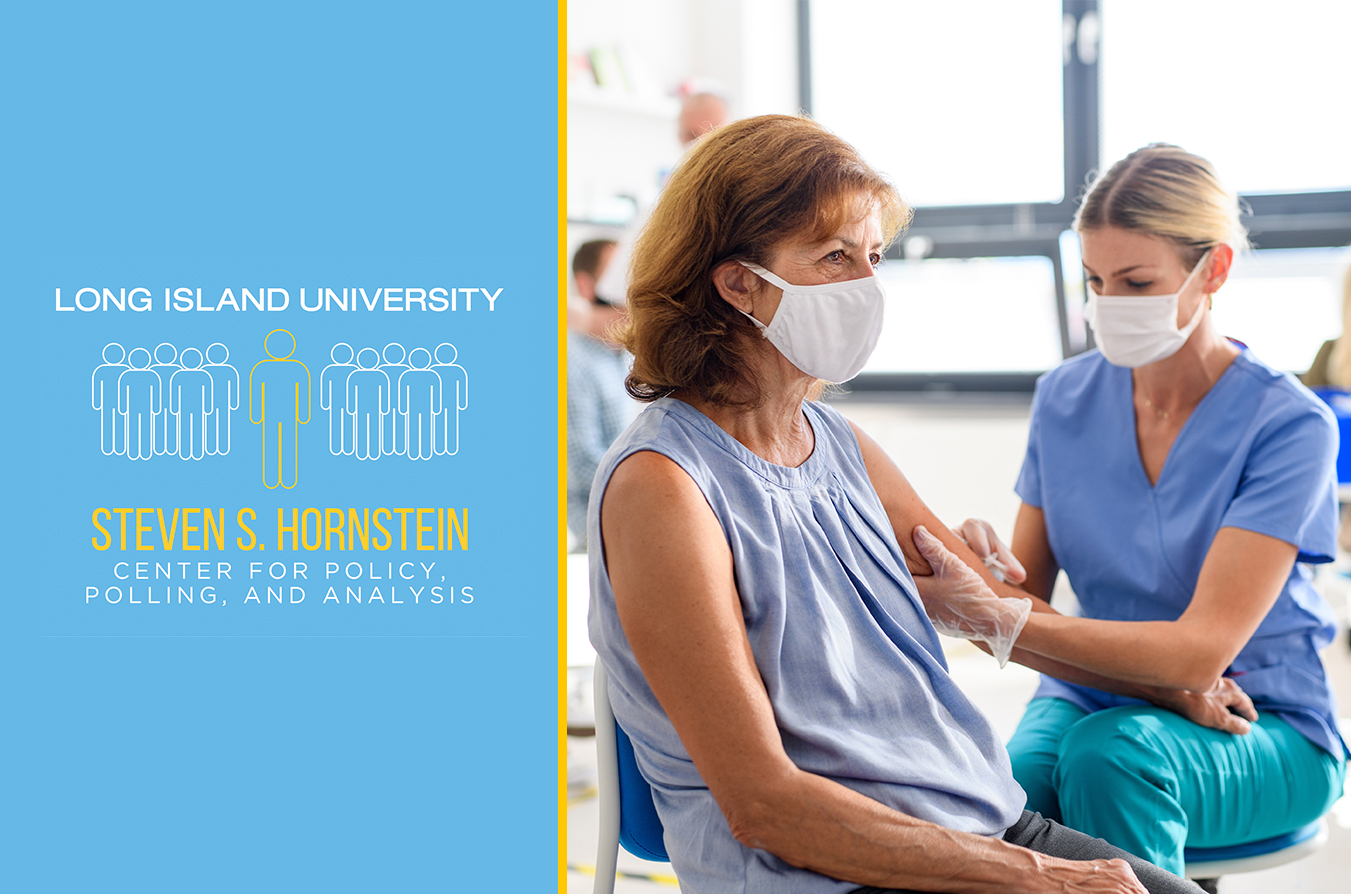BROOKVILLE, NY, October 6, 2020 – Results of a breaking Long Island University Steven S. Hornstein Center for Policy, Polling and Analysis national poll on what Americans think about the coronavirus reveal that while there was uncertainty over taking a vaccine if it were available today, most respondents were confident that wearing masks reduces the spread of the virus.
PDF Format – Includes sample and methodology detail
MIXED CONFIDENCE IN POSSIBLE CORONAVIRUS VACCINE
Americans were asked if they would agree to be vaccinated if an FDA approved coronavirus vaccine was available right now. The result was a mixed response. Of the respondents, 38.2% said yes, 33.4% said no, and 28.4% said they didn’t know or gave no answer. Male respondents said yes at a higher rate (47%) than female respondents (31%).
THE MAJORITY OF AMERICANS (84%) ARE CONFIDENT THAT WEARING A MASK IN PUBLIC REDUCES THE SPREAD OF THE CORONAVIRUS
National poll results found that 84% of respondents said they believe that wearing a mask in public reduces the spread of the coronavirus, while 10% did not believe that wearing a mask in public makes a difference, and 6% said they were not sure. Respondents with a household income above $100,000 showed confidence levels in masks at a higher rate (89%) than those with a household income below $100,000 (83%).
CONFIDENCE LEVEL OF WEARING MASKS IN PUBLIC TO REDUCE SPREAD OF CORONAVIRUS IS HIGHER IN NORTHEAST AND PACIFIC REGIONS; LOWER IN MIDWEST, SOUTH, AND MOUNTAIN REGIONS
Regional differences exist in Americans’ belief that wearing a mask in public reduces the spread of the coronavirus. Respondents with the highest confidence level in wearing masks in public live in the Northeast (90%) and Pacific (89%) regions. Respondents with lower confidence levels regarding wearing masks in public live in the Midwest (81%), South (83%), and Mountain (78%) regions.
CONCERN OVER CORONAVIRUS IS HIGHER IN NORTHEAST AND PACIFIC REGIONS; SLIGHTLY LOWER IN MIDWEST, SOUTH, AND MOUNTAIN REGIONS
Respondents with the highest concern that they or someone in their family could become seriously ill from the coronavirus live in the Northeast (79%) and Pacific (81%) regions. Respondents living in the Midwest (74%), South (76%), and Mountain (76%) regions had slightly less concern over contracting the coronavirus.
MIDWEST, SOUTH, AND MOUNTAIN REGIONS ARE NOW TOP CORONAVIRUS HOT SPOTS IN U.S.
The top U.S. regional hot spots hit hardest by coronavirus outbreaks following the Long Island University National Poll results are in the Midwest, South, and Mountain regions. As of October 5, 2020, the 100 counties in the U.S. with the highest number of weekly cases per capita are located in the Midwest region (67 counties), followed by the South region (18 counties), and Mountain region (15 counties). The Northeast and Pacific regions did not have any counties in the top 100 coronavirus hot spots as of October 5, 2020.
METHODOLOGY
This Long Island University Steven S. Hornstein Center for Policy, Polling, and Analysis online poll was conducted through SurveyMonkey from September 24 – 26, 2020 among a national sample of 1,508 adults ages 18 and up. Respondents for this survey were selected from the nearly three million people who take surveys on the SurveyMonkey platform each day. Data for this week have been weighted for age, race, sex, education, and geography using the Census Bureau’s American Community Survey to reflect the demographic composition of the United States. The modeled error estimate for this survey is plus or minus 3.5 percentage points.
ABOUT THE LONG ISLAND UNIVERSITY STEVEN S. HORNSTEIN CENTER FOR POLICY, POLLING, AND ANALYSIS
The Long Island University Steven S. Hornstein Center for Policy, Polling, and Analysis conducts independent polling, empirical research, and analysis on a wide range of public issues. Our studies inform the public and policy makers about critical issues, attitudes, and trends shaping the world. Faculty and scholars from all schools of study at Long Island University participate in data collection and analysis. Visit liu.edu/Hornstein for more information and results from this national poll.
ABOUT LONG ISLAND UNIVERSITY
Long Island University, founded in 1926, continues to redefine higher education, providing high quality academic instruction by world-class faculty. Recognized by Forbes for its emphasis on experiential learning and by the Brookings Institution for its “value added” to student outcomes, LIU offers over 250 degree programs, with a network of 270,000 alumni that includes industry leaders and entrepreneurs across the globe. Visit liu.edu for more information.



